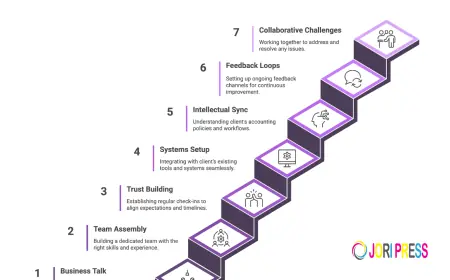Unlock Your Future: Top Career Paths After Completing a Saudi Taxation Course

Introduction
In a rapidly evolving economic landscape, taxation has emerged as a powerful and stable career pillar—especially in Saudi Arabia. With the Kingdom's ongoing economic diversification under Vision 2030, demand for tax professionals has skyrocketed. If you've recently completed a Top Career Opportunities After Taking a Saudi Taxation Course, you’re standing at a pivotal crossroads that could shape your financial future. But where should you go next? What are the most lucrative and impactful paths you can take?
This guide will walk you through 7 top career opportunities that open up after completing a taxation course in Saudi Arabia. We’ll also tackle the most frequently asked questions, provide actionable insights, and share real-world strategies to accelerate your career growth.
Why Taxation Matters in Saudi Arabia Right Now
The implementation of Value-Added Tax (VAT), Excise Tax, and enhanced Zakat regulations has transformed the business environment. As companies scramble to stay compliant and optimize their tax strategies, tax professionals have become indispensable.
According to the General Authority of Zakat and Tax (GAZT), businesses across the Kingdom are investing more than ever in tax compliance, audits, and planning—resulting in a 30% increase in demand for certified taxation professionals over the last two years.
Top 7 Career Paths After Completing a Saudi Taxation Course
1. Tax Consultant
Why it’s hot: Tax consultants are in high demand across industries, especially in accounting firms and multinational corporations operating in Saudi Arabia.
Key Skills Needed: VAT expertise, Zakat law knowledge, client advisory, compliance.
Average Salary: SAR 120,000–200,000 per year.
Pro Tip: Specialize in VAT advisory to land high-paying roles quickly.
2. Tax Auditor
Why it’s impactful: Government bodies and private firms need auditors to ensure tax accuracy and identify compliance risks.
Industries Hiring: Government (ZATCA), Big Four firms, large enterprises.
Stat: Over 1,500 tax audits were conducted by ZATCA in 2024 alone—showing consistent demand.
3. Corporate Tax Analyst
What you do: Analyze, report, and plan tax strategies for corporations.
Top Employers: SABIC, Aramco, Ma'aden, and other Vision 2030-aligned enterprises.
Insider Tip: Develop strong Excel and ERP system skills to stand out.
4. Zakat & Compliance Officer
Unique Role: Exclusive to Saudi Arabia, this position focuses on ensuring businesses adhere to Zakat requirements.
Qualifications Needed: Deep knowledge of Islamic financial principles and local Zakat regulations.
Demand Driver: Over 500,000+ entities in Saudi Arabia are Zakat-liable, ensuring long-term demand.
5. VAT Specialist
Scope: Focus on everything related to Value-Added Tax—from implementation to strategic planning.
Ideal For: Those who enjoy research, policy analysis, and optimization.
Urgency Factor: As VAT evolves, specialists who stay updated have a significant edge.
6. Transfer Pricing Analyst
Emerging Role: With Saudi Arabia aligning with OECD guidelines, transfer pricing is a hot growth area.
Ideal Candidate: Finance-savvy professionals with international tax exposure.
Fast Fact: This niche is currently understaffed, offering lucrative early-entry opportunities.
7. Tax Technology Advisor
Future-Proof Role: As e-invoicing and digital compliance surge, companies seek professionals who can merge tax and tech.
Toolkits Needed: SAP, Oracle, Zoho, and other tax tech platforms.
Why You Should Care: Companies using e-invoicing have reported a 20% increase in tax compliance efficiency.
Frequently Asked Questions (FAQs)
Q1: Is a Saudi Taxation Course enough to get a job?
Yes—especially when combined with strong communication skills, basic accounting knowledge, and ERP software proficiency. Many employers now consider tax certification as a mandatory requirement.
Q2: What industries are hiring taxation professionals in Saudi Arabia?
The top sectors include energy, finance, healthcare, retail, and public services. Additionally, the Big Four accounting firms (PwC, KPMG, Deloitte, EY) are constantly hiring.
Q3: Do I need a finance degree as well?
While helpful, it’s not essential. Many roles prioritize tax knowledge over traditional finance degrees.
Q4: How can I boost my chances of being hired quickly?
Build a professional LinkedIn profile, earn a certification from a reputable institution, and gain hands-on training with e-invoicing and VAT filing systems.
Q5: Can I freelance as a tax consultant?
Absolutely. With businesses struggling to navigate new tax laws, freelancing can be both flexible and highly profitable—especially for SMEs.
Pro Strategies to Accelerate Your Tax Career in Saudi Arabia
-
Build a Personal Brand: Share taxation insights on LinkedIn, write blogs, and network with professionals.
-
Stay Updated with ZATCA Announcements: Changes in tax law happen fast; being informed gives you an edge.
-
Learn Bilingual Communication (Arabic & English): Multinational and local firms seek bilingual advisors.
-
Get Certified in VAT and E-Invoicing Tools: These skills are now baseline requirements.
-
Offer Pro Bono Work Initially: Gain experience and testimonials by helping small businesses first.
Conclusion
A Saudi Taxation Course isn’t just an educational credential—it’s a launchpad. Whether you're aiming to enter corporate finance, advisory roles, or government service, taxation expertise is indispensable in today’s economy. With smart positioning, continuous learning, and strategic networking, you can unlock a rewarding, future-proof career path that aligns with both Saudi Arabia’s growth and your personal ambitions.
What's Your Reaction?
 Like
0
Like
0
 Dislike
0
Dislike
0
 Love
0
Love
0
 Funny
0
Funny
0
 Angry
0
Angry
0
 Sad
0
Sad
0
 Wow
0
Wow
0

















































